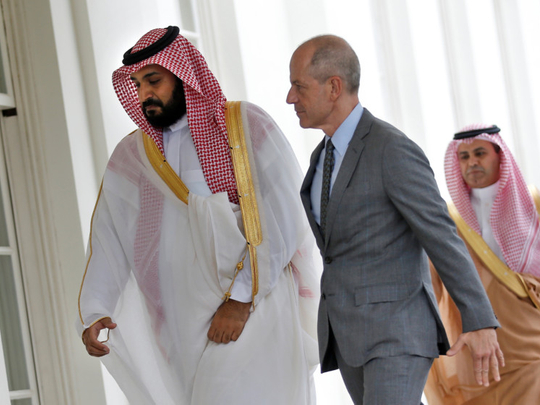
WASHINGTON: US President Barack Obama hosted youthful Saudi Arabian Prince Mohammad Bin Salman at the White House on Friday, underscoring his guest’s meteoric rise and increasingly pivotal role in managing strained US-Saudi ties.
The 30-year-old deputy crown prince - who has become the driving force behind economic reform and a more activist Saudi foreign policy - swept into the West Wing with a band of aides.
Mohammad Bin Salman is the King’s son and the country’s defense minister, but he has met the very biggest of Washington’s big hitters during a week-long visit.
He held talks with the CIA director, the secretaries of state, defense and treasury, as well as leading members of Congress.
The White House said Prince Mohammad’s meeting with Obama took place in the Oval Office - a rare honour for a non-head of state, one not afforded to the Dalai Lama earlier in the week.
For the White House, Mohammad Bin Salman is a relative unknown, while Mohammad Bin Nayef, Saudi Arabia’s first deputy prime minister and interior minister, has been the go-to royal on counterterrorism for years.
Prince Mohammad “wants to be known on the US side,” said Gregory Gause, head of the international affairs department at Texas A&M University’s Bush School of Government and Public Service. “It’s an effort by him to be recognized.”
The meeting comes as ties between the US and Saudi Arabia are strained over how to approach Riyadh’s arch-enemy Iran, the war in Yemen and the seemingly imminent release of a US dossier about Saudi Arabian links to the September 11, 2001 attacks.
Economic reform
High on the agenda of the meeting will be Prince Mohammad’s efforts to overhaul Saudi Arabia’s state-dominated and oil-dependent economy, bringing in the private sector and creating jobs for the country’s young population.
“Given their huge investment in education over the last decade, if they are not able to move away from a state-run economy and develop a private sector, you are not going to have the jobs that young people need to have hope,” said former US ambassador to Saudi Arabia James Smith.
Amid disagreements over the US nuclear deal with Iran, economic reform appears to be a much-needed issue that could bring Riyadh and Washington together.
After Prince Mohammad met top US economic policymakers on Wednesday, including Treasury Secretary Jack Lew, the White House “underscored the United States’ desire to be a key partner in helping Saudi Arabia implement its ambitious economic reform programme.”
Prince Mohammad is also sure to address another of his signature policies - Saudi Arabia’s war in Yemen, which has been a point of deep contention between the White House and the royal court.
The United States has aided and publically backed the operation to push back against Iranian-backed Al Houthi rebels who took over the capital Sanaa.










